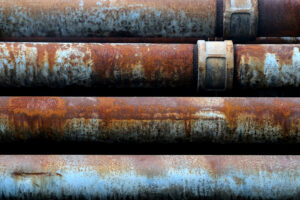Rusting Pipes Affecting Your Home: Causes and Remedies

Rust is a common enemy of plumbing systems, and if left unchecked, it can wreak havoc on your home. Rusting pipes not only lead to costly repairs but can also impact the quality of your water supply. In this blog post, we will explore the causes of rusting pipes, early signs to watch out for, and essential steps you can take to remedy the problem.
Causes of Rusting Pipes
- Age of Pipes: As pipes age, they become more susceptible to rust and corrosion. Older homes with galvanized steel pipes are particularly at risk since these pipes eventually rust from the inside out.
- Water Chemistry: The composition of the water running through your pipes can influence the rate of corrosion. Water with a high acidity level or high mineral content can accelerate rust formation.
- High Humidity: Areas with high humidity levels can promote the accumulation of moisture on pipe surfaces, creating an environment conducive to rusting.
- Pipe Joints and Fittings: The points where pipes connect or have fittings are potential weak spots where rust can develop.
Early Signs of Rusting Pipes
- Discolored Water: If you notice reddish-brown water coming from your taps, it is a clear sign of rust in your pipes.
- Low Water Pressure: Rust can cause build-up and blockages, leading to reduced water pressure in your plumbing system.
- Metallic Taste or Odor: Rust particles in the water may impart a metallic taste or smell, making it unpleasant for consumption.
- Water Leaks: Rust can weaken pipes, causing them to develop leaks, which may result in water damage to your property.
Steps to Remedy Rusting Pipes
- Regular Inspections: Schedule regular inspections of your plumbing system by a professional plumber. They can identify early signs of rust and corrosion and take necessary actions.
- Water Testing: Conduct water testing to determine the mineral content and pH levels. If your water is acidic, installing a water softener or neutralizer can help reduce the corrosion effect.
- Pipe Replacement: In cases of severely rusted or corroded pipes, consider replacing them with more durable and rust-resistant materials, such as copper or PEX.
- Pipe Coating: Applying epoxy coatings to the interior of existing pipes can create a protective barrier, reducing the chances of rusting.
- Install a Water Filtration System: Installing a whole-house water filtration system can help remove rust particles and other impurities, ensuring cleaner water.
- Address Leaks Promptly: If you spot leaks, address them promptly to prevent further damage to your pipes and surrounding areas.
- Keep Humidity in Check: Reduce indoor humidity levels through proper ventilation, especially in areas with exposed pipes.
- Flush the System: Regularly flush your plumbing system to remove sediment and debris that might promote rusting.
Call Us
Rusting pipes can have significant repercussions on your home’s plumbing system and water quality. By understanding the causes and recognizing early signs of rusting, you can take proactive steps to address the issue before it escalates. Regular inspections by a professional plumber, water testing, and timely repairs or replacements are crucial in maintaining a healthy plumbing system and preventing costly damages –– which is why you should call Hank & Sons Plumbing. Located in Pomona, California, we have years of experience in the industry and countless happy customers behind our back. Even better yet, we’re just one quick phone call away: 909-524-2906.


